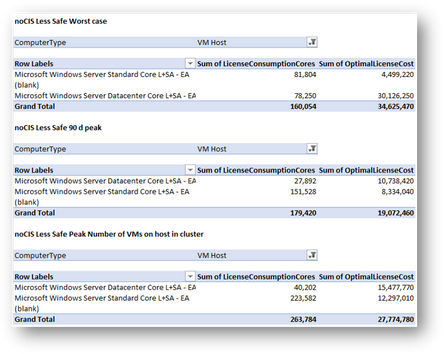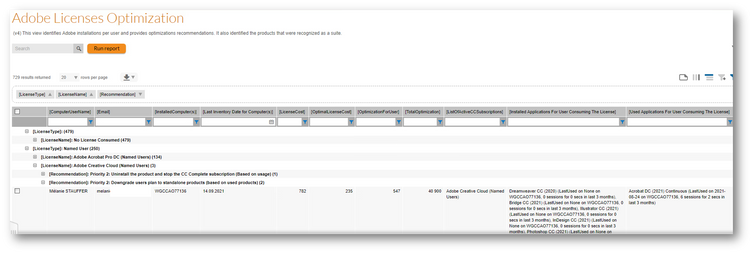
- Flexera Community
- :
- FlexNet Manager
- :
- FlexNet Manager Blog
- :
- Windows Server, SQL Server, Red Hat and Oracle Optimization: SAM Best Practices Webinars recordings ...
- Subscribe to RSS Feed
- Mark as New
- Mark as Read
- Subscribe
- Printer Friendly Page
- Report Inappropriate Content
This article is related to Flexera FNMS September Newsletter
A new track started in July: The monthly SAM Best Practices Webinars.
News and deep dive on specific topics, the goal of the webinars is to keep FNMS user aware of what is new in the product, as well as what they have had for ever but maybe did not know.
The first session recording and presentation are available in this post. The session introduced FNMS 2021R1 in details and drilled down on the Oracle Optimization reports released in FNMS.
The second session focused on Red Hat Linux, Windows and SQL Server Optimization. Full recording can be found here.
Optimization deserves more than a post... this is one crucial lever of SAM.
"Invent a complex or nasty rule and you will make more money" could be the moto of Oracle, Red Hat or Microsoft. For sure, the constant evolution of technology (particularly virtualization, that allow virtual machines to move across hosts, cluster and even vCenters now!) has forced Publishers to adapt their rules... that have become so complex and force customers to either pay high licenses amounts (Oracle) or choose the safe and expensive options (Microsoft with Windows Server in particular). If you want to know more, check out this this post released in 2020: When good intentions, good will and sincerity lead to licensing nightmares and financial waste.
"First type of optimization: count differently your consumption"
Quick Focus on Windows Server:
- You have a choice between multiple Licenses
- Windows Server or Core Infrastructure Server (that includes Windows Server and System Center)
- You have a choice between multiple editions
- Windows Server DataCenter Edition (7 times more expensive than Standard Edition)
- Unlimited VMs covered
- Windows Server Standard Edition: cheaper but two rules
- More VMs will require more licenses
- A license covering a VM on a host cannot be “reallocated” to another host for 90 days
- Windows Server DataCenter Edition (7 times more expensive than Standard Edition)
80% of companies choose the very easy option: "All ESX hosts in DataCenter" or a less easy that turns often the DataCenter choice: the "Worst case". What if all VMs in a cluster landed on each of the hosts?
These approaches extremely high cost. For a 2500 ESX Hosts / 40 000 VMs estate... the perpetual license cost difference between the worst case and the 90 day peak is USD15 million!
A published solution provides a report that allows to catch information that will allow to choose the optimal license to conver your ESX servers:
- Presence of SCCM in Cluster, ratio on Windows Server VMs installed
- VMs installed in Windows Server Standard or DataCenter editions
- Current number of VMs for each host, current number of VMs in clusters, 90 peak number of VMs for the host
- Based on these metrics, the report give you the choice on how you want to calculation your optimal consumption
- Optimization approach
- Worst case (expensive but safe)
- Highest number of VMs on a host in cluster (a sort of "realistic worst case"
- Actual peak number of VMs over 90 day
- Level of risk
- less safe: All VMs (Standard and DataCenter edition) are considered indifferently
- Safe: a DataCenter edition VM in a cluster will require the need for DataCenter edition
- The licenses in scope: CIS, Windows Server or both
- Optimization approach
The report allows you to compare the option and their related cost.
This report is planned for end of 2021 / early 2022.
SQL Server is a similar, but simpler story
The published (and plan for Q4 report) allows to assess host per host the best option between covering all VMs with SQL Enterprise or each VM (installed with Standard only) with Standard edition licenses and each VM installed with SQL Enterprise (+ eventually Standard) with SQL Enterprise. There is no mobility rule with SQL server under Software Assurance... no need for peaks or worst case.
Red Hat Linux optimization report released in SaaS in September and published in this KB article applies a logic that is closer to Windows Server... customer have a choice with the Server and Virtual DataCenters editions that are more adapter to "Red Hat high density" clusters... with a constraint of uniform licensing in the cluster. Released reports calculate cluster per cluster the optimal license (based on costs and calculate the optimal position). More details here.
Second type of optimization: "Change your infrastructure or downgrade subscriptions"
Oracle database: move your VMs!
With Oracle, this issue is not that the rule is ambiguous (even if there are several levels of "soft partitioning" applied more or less systematically), the rule is super expensive. "a VM in a cluster installed with Oracle Enterprise Edition or a used option will trigger the need to license the full cluster (or vCenter... or vCenter!).
2 reports have been released in July, 3 more in September that analyse in all angles you Oracle Database and used options estate to identify the potential savings (moving VMs out of low density clusters) and even sugges you a "target cluster architecture" that will minimize your costs... The reports also simulate the consumption and financial impact of the various soft partitioning rules.
Published Oracle optimization reports for on prem are in the KB article
Screenshot are more efficient than long explanations!
Adobe: deep dive on each user situation
Adobe has not yet been addressed in the SAM Best Practices Webinars but I can't resist...
"OK, Nicolas subscribed to Creative Cloud CC... which gives access to 13 stand alone applications (Photoshop, Illustrator, Acrobat DC...), what, what did he really installed, what is he really using? Does he have two subscription that overlap?". This simple question has no easy answer today.
The Adobe Subscriptions Optimization Report & Adobe Portal Users importer published solution provides a PowerShell import for Adobe users (from the Portal) and a report that will do the full analysis an provides prioritized recommendations on downgrades, with calculation of the financial savings.
You must be a registered user to add a comment. If you've already registered, sign in. Otherwise, register and sign in.
- FlexNet Manager Suite On-Premises 2023 R2 in FlexNet Manager Release Blog
- Numbers of records in report in FlexNet Manager Forum
- Importing Microsoft RDS CALS and Allocating to Licenses (Current/Optimal) in FlexNet Manager Knowledge Base
- Active Directory records in FlexNet Manager Forum
- ORCL_Overview - FMW (Middleware) Records have Application=BLANK in FlexNet Manager Forum






